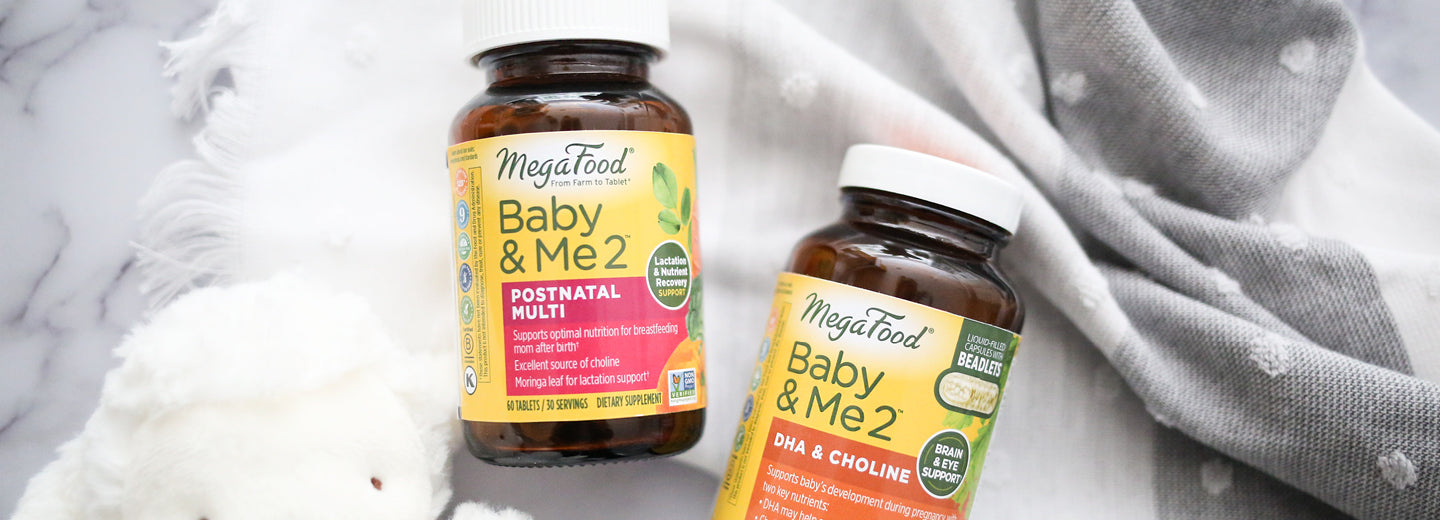Why Should I Take a Postnatal Multi?

MegaFood | May 2022
Should women who have already given birth take a postnatal vitamin? Or should they continue taking a prenatal vitamin after the baby is born? As soon as a woman is postpartum, her body switches focus and requires different nutrients in different amounts to help with breastfeeding and recovery for her post-birth body. Key postnatal nutrients include D3, C, Iodine, Chromium and Choline. Postnatal multivitamins can be an easy way to support the nutritional needs of new and nursing moms.
Some mothers choose to continue taking their prenatal vitamins after giving birth, but while prenatal and postnatal supplements contain the same types of nutrients, mother’s and baby’s nutritional requirements dramatically change at each stage of the journey, from conception to breastfeeding. Put simply, mom and baby need different amounts of certain vitamins at different times. A postnatal multivitamin is deliberately formulated to help support a breastfeeding mom and her developing baby.*
What are Postnatal Vitamins?!
Optimal nutrition before, during and after pregnancy plays a key role in the health of both mom and baby. Postnatal vitamins are designed to supplement both the vitamins in the mother’s diet and the nutrients she passes along to her baby via breastfeeding.
“If you’re breastfeeding, you’re providing all of the nutritional needs for your baby — and you can’t give what you don’t have,” says Dr. Tieraona Low Dog, MegaFood's Chief Medical Advisor and expert in women's health and dietary supplements. ”If you don’t have enough of the right nutrients, the baby can end up lacking. But babies try to take what they need, even at the mother’s expense, so moms can actually be left rather depleted. And if mom is getting too many things, that can be hard and not safe for her.”
An important benefit of postnatal multivitamins is that they contain the following nutrients:
- Vitamin C is commonly found in citrus fruits, tomatoes, potatoes, bell peppers and several other fruits and vegetables. The body uses it to help support a healthy immune system. It passes through breast milk so its presence in a postnatal multivitamin benefits the baby as well as the mother, according to the nonprofit Institute for the Advancement of Breastfeeding and Lactation Education (IABLE).
- Vitamin D3, also known as cholecalciferol, helps the body to absorb calcium. As we all know, calcium is a vital nutrient for healthy bones and teeth. Vitamin D3 is found in foods like fatty fish and other seafood, mushrooms and egg yolks, and it can be absorbed into the body by spending time in the sun. But if a new mom isn’t able to meet her vitamin D3 needs dietarily, or spend a lot of time outdoors, then a supplement included in a postnatal multivitamin is a good way to help get the daily requirements, per the Mayo Clinic.
- Vitamin E supports a healthy immune system, which is important for a breastfeeding mom and developing baby. According to the National Institutes of Health, it also helps the body to promote muscle development and maintain red blood cells, healthy skin and eyes. All of these things are crucial for growing babies, which is why vitamin E in postnatal multivitamins is included at a 5% higher level than in prenatal supplements. Vitamin E can also be found in foods such as almonds, peanuts, peanut butter, beet greens, collard greens, spinach, pumpkin and red bell pepper.
- Chromium is commonly found in a wide range of fruits, vegetables, grains and meats. Chromium deficiencies are rare, per the CS Mott Children’s Hospital at the University of Michigan, but if a new mother’s diet is unable to provide the required daily levels of the mineral, postnatal multivitamin supplementation can help.
- Iron is key in the creation of hemoglobin, which carries oxygen around the body in red blood cells. It’s important for a baby’s neurological development but isn’t heavily present in breast milk, which is why iron supplements in a postnatal multivitamin are so important. Iron levels in postnatal supplements drop from 27 mg in prenatals down to 9 mg, because the mother’s blood is no longer required to pass oxygen along to the child.
- Iodine While breast milk usually contains enough iodine, per the CDC, the American Thyroid Association and the American Academy of Pediatrics recommend that nursing mothers take a supplement of iodine as part of a postnatal multivitamin. Iodine consumption should increase between prenatal and postnatal multivitamins (220 mcg to 290 mcg) because the baby, once born, is able to regulate higher iodine levels.
- Vitamin B12 is crucial in the formation of red blood cells, cell metabolism, nerve function and DNA production. It’s found in meat, fish, poultry and dairy, but since babies aren’t eating those foods within the first year, they’ll need supplementation through breast milk. A postnatal vitamin can help provide B12 to a new baby. A 2013 study showed that a lack of B12 in a nursing mom’s diet can affect the nutritional quality of breast milk, meaning baby gets less B12 when they feed. Supplementing B12 intake with a prenatal multivitamin helps to meet a child’s nutritional needs.
- Choline is created in the liver and is an essential nutrient that supports several vital body functions and is considered key for a baby’s brain development, according to the National Institutes of Health. It can be found in foods such as meats, fish, nuts, beans, vegetables and eggs. It’s recommended that pregnant women take 450 mg choline daily, but post-delivery that daily requirement jumps to 550 mg to account for potential dietary deficiencies, so a postnatal multivitamin containing choline is beneficial for mother and baby.
What are the Benefits of Taking Postnatal Vitamins?
A postnatal vitamin supplement is an important addition to any new and nursing mother’s diet to help replenish their body’s nutrients after the requirements of pregnancy and childbirth. Let’s break down the benefits of taking postnatal vitamins.
Can a Postnatal Vitamin Support Breastfeeding?
The body requires up to 500 extra calories per day to make milk to nourish a new baby. Those calories and the essential vitamins and minerals for infant development can be found in many food groups. However, keeping track of dietary intake is difficult, especially with a new baby. This is why a good postnatal multivitamin supplement aims to help support nursing moms with the nutrients they need.
Can a Postnatal Vitamin Help to Avoid Vitamin D Deficiency?
Breast milk doesn’t contain sufficient levels of vitamin D3 that the newborn needs for proper bone mineralization, per the Mayo Clinic. That means it’s essential for mothers to provide supplementary vitamin D3 for their nursing child. Vitamin D3 is found in foods like fatty fish and other seafood, mushrooms and egg yolks, and it can be absorbed into the body by spending time in the sun. But if a new mom isn’t able to meet her vitamin D3 needs dietarily, or spend a lot of time outdoors, then a postnatal with a dosage specifically tailored to the needs of nursing mothers is much more beneficial than continuing to take a prenatal vitamin supplement. MegaFood Prenatal Multi contains 100% of the recommended daily dose of vitamin D3, but a postnatal multi bumps that dosage up to 167%.
How Long Should Moms Take a Postnatal Vitamin?
Here’s the short answer: Moms should continue to take a postnatal as long as they breastfeed. The American College of Obstetricians and Gynecologists recommends that moms continue to supplement their dietary needs with a postnatal multi to ensure that their nutritional needs are being met.
For new and nursing moms considering having another child in the future, take a postnatal vitamin while breastfeeding and then switch to a prenatal once pregnant so both mom and developing baby get nutritional support.
*These statements have not been evaluated by the Food and Drug Administration.This product is not intended to diagnose, treat, cure or prevent any disease."


Leave a comment
This site is protected by hCaptcha and the hCaptcha Privacy Policy and Terms of Service apply.